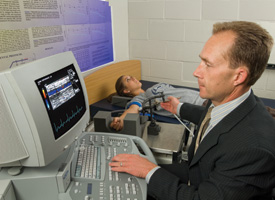 Jeff Volek, associate professor of kinesiology in the Neag School of Education, received an $80,000 grant from the Dr. Robert C. and Veronica Atkins Foundation to study the effects of low-carbohydrate diets on health and performance.
Jeff Volek, associate professor of kinesiology in the Neag School of Education, received an $80,000 grant from the Dr. Robert C. and Veronica Atkins Foundation to study the effects of low-carbohydrate diets on health and performance.
Volek has been studying the body’s response to carbohydrate restriction for more than a decade. The low-carb diet, which was introduced by Dr. Robert Atkins in the 1960s, was called bizarre, nonsensical, even dangerous by most mainstream nutritional and medical experts because of its emphasis on low-carb eating over low-fat foods and calorie restriction.
Volek’s studies have helped demonstrate the benefits of the approach not only for weight management, but also for improving health. He recently coauthored the New York Times best-selling book, “The New Atkins for a New You,” and more recently two books, ‘The Art and Science of Low Carbohydrate Living,’ and ‘the Art and Science of Low Carbohydrate Performance.’ “The books give an in-depth perspective on the controversial and often misunderstood topic of low carbohydrate diets,” says Volek.
Using sophisticated cellular techniques to understand the body’s response to low-carb diets, Volek says his studies and those of others are helping to shift our understanding. “It’s clear that carbohydrate restriction has beneficial effects on many health risk factors, especially those related to insulin resistance (also known as carbohydrate intolerance), even in the absence of weight loss and even in the presence of higher fat and saturated fat intake,” says Volek. “I think we may finally be reaching a tipping point in terms the scientific evidence reaching mainstream acceptance. A large number of people could benefit from restricting dietary carbohydrates.”
The Atkins Foundation, established by Dr. Atkins and his wife Veronica, funds independent research on the role of metabolism and nutrition on a number of diseases and has provided nearly $1 million in support for Volek’s research over the years. The latest grant will support several studies currently in progress, says Volek.
One project looks at the effect of incremental increases in dietary carbohydrates on saturated fat levels and markers for heart disease. The goal is to show that blood saturated fat levels stem from the intake of carbohydrates rather than the intake of saturated fat. The goal is a re-evaluation of the widespread belief that dietary saturated fat is harmful, says Volek. His hypothesis: “People have a unique amount of carbohydrate they can tolerate before they start to mismanage it, which includes converting it into saturated fat.”
Another study looks at the changes in bacteria in the gut, or microbiome, as a factor affecting an individual’s response varying amounts of dietary carbohydrate. “We think it is highly probable that changes in specific populations of bacteria will correlate with dietary manipulation of carbohydrates and with diet-induced metabolic effects.”
A third study looks at the effects of a low-carb diet on distance runners in the Western States Endurance Run, a 100-mile ultramarathon that lasts from 14 to 30 hours on the trails of the Sierra Nevada mountains in California.
This year’s race was won by a low-carb diet athlete and several of the top finishers were restricting carbohydrates, according to Volek, who with colleagues is analyzing cheek cells and blood samples collected from the racers before and after the event. “We have reason to believe that the inflammation and the tissue damage that occurs from the stresses related to such an endurance event can be reduced by a low carbohydrate diet.”
 Facebook
Facebook
 Twitter
Twitter
 LinkedIn
LinkedIn
